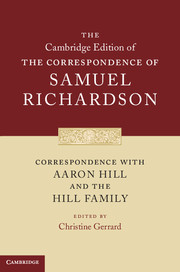General Editors’ Preface
Published online by Cambridge University Press: 30 June 2022
Summary
Thanks to the editorial labours of the twentieth century, there are few major British authors of the eighteenth century – the classic period of the familiar letter as a genre – whose correspondence is not available in a standard scholarly edition. Some of the most ambitious undertakings, such as the Yale edition of James Boswell and the Oxford/McGill-Queen's edition of Frances Burney, are still in progress, and some of the most long-standing, such as the Oxford and Chicago editions of Alexander Pope and Edmund Burke respectively, now require extensive supplementation, perhaps even replacement. But there is no more anomalous case than Samuel Richardson, whose correspondence holds special interest, beyond its extraordinary scale and range, as that of a practising epistolary novelist who thought longer and harder than any contemporary about the letter as a form. Almost half of the surviving Richardson correspondence, which totals almost 1,700 letters, has never appeared in print, and barely a quarter of it is represented – with silent abridgements, conflations, and other interventions – in the early edition on which scholars have had to rely until now, Anna Laetitia Barbauld's six-volume The Correspondence of Samuel Richardson (1804).
The process of publication got off to a good enough start. Individual items began appearing in print within Richardson's lifetime, and in his last years he took practical steps towards preparing a selected edition. Even before the success of Pamela propelled him to fame in the early 1740s, a reply he wrote in humorous couplets to a guild invitation – emphatically a rhyming letter, not a verse epistle – found its way into the Gentleman's Magazine for January 1736. The epistolary commentaries he printed about later novels, such as his Answer to the Letter of a Very Reverend Worthy Gentleman, Objecting to the Warmth of a Particular Scene in… Clarissa (1749) or his Copy of a Letter to a Lady, Who Was Solicitous for an Additional Volume to … Sir Charles Grandison (1754), were formal versions of actual letters, written and sent in response to letters he received. Richardson also included as an appendix to Sir Charles Grandison extracts from his acrimonious correspondence withGeorge Faulkner, theDublin bookseller, about literary piracy and property.
- Type
- Chapter
- Information
- Correspondence with Aaron Hill and the Hill Family , pp. ix - xxiiPublisher: Cambridge University PressPrint publication year: 2013

